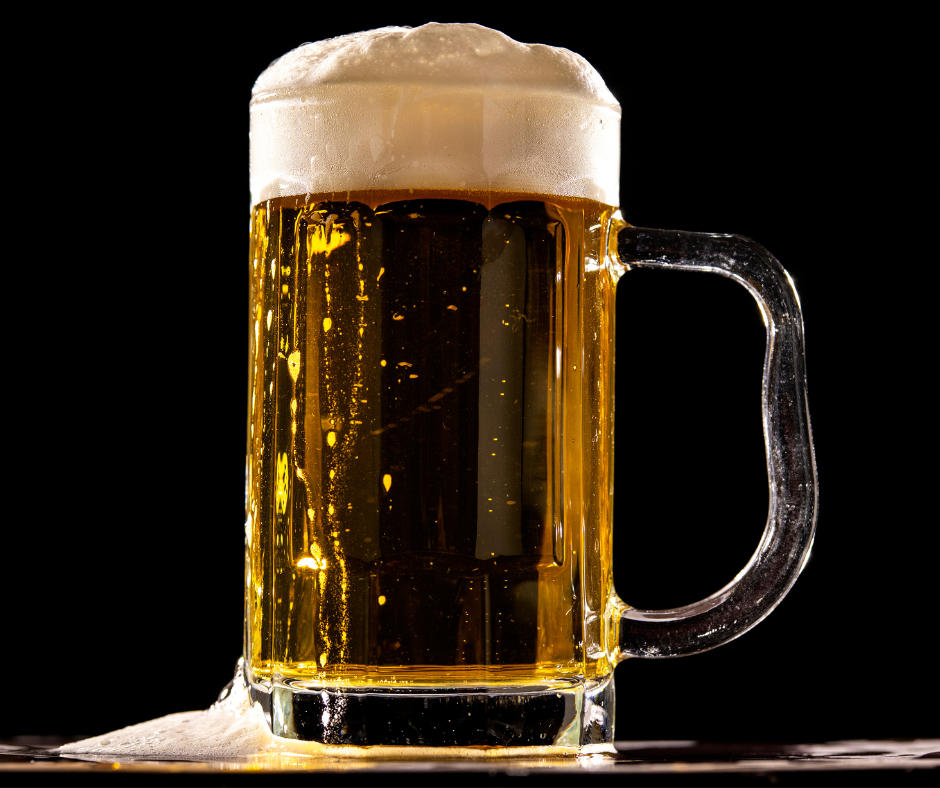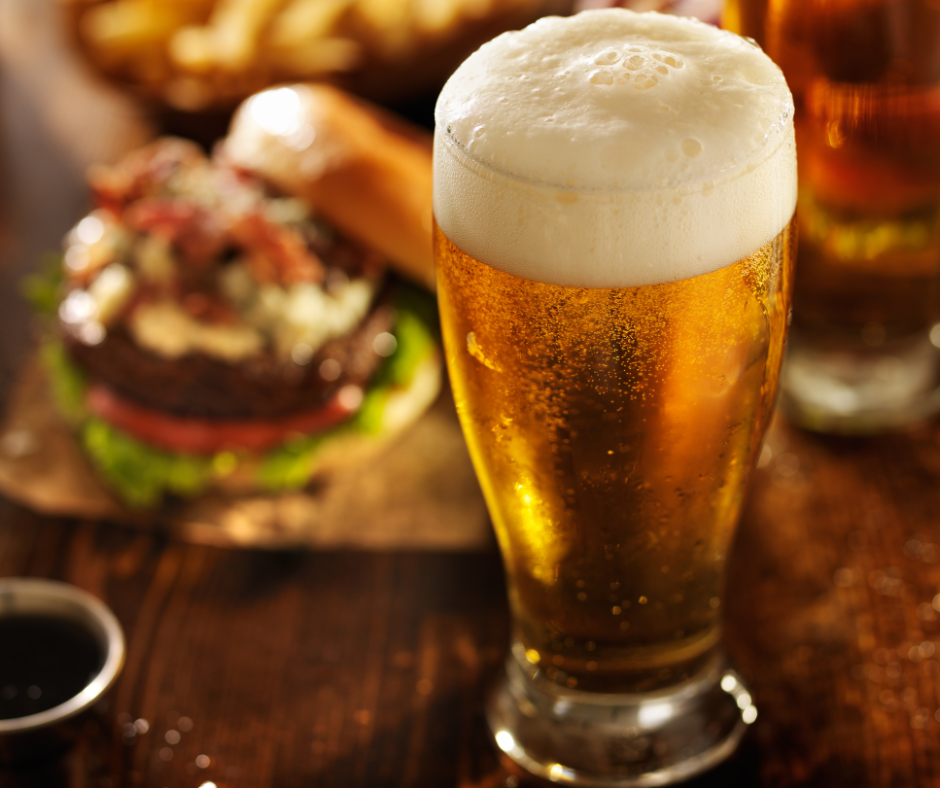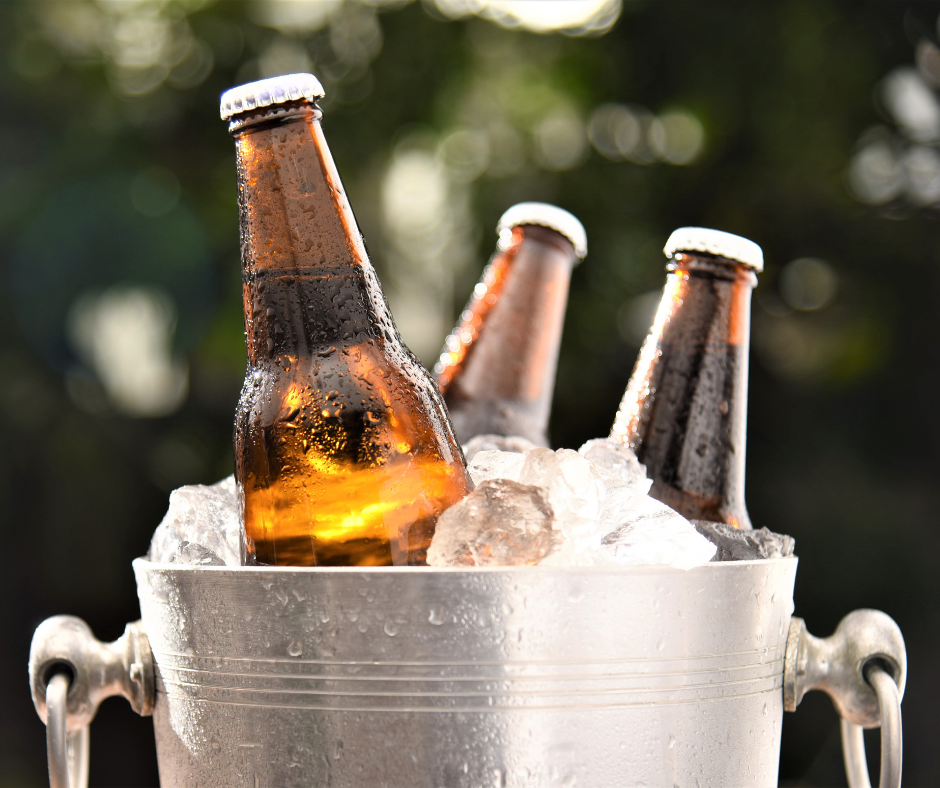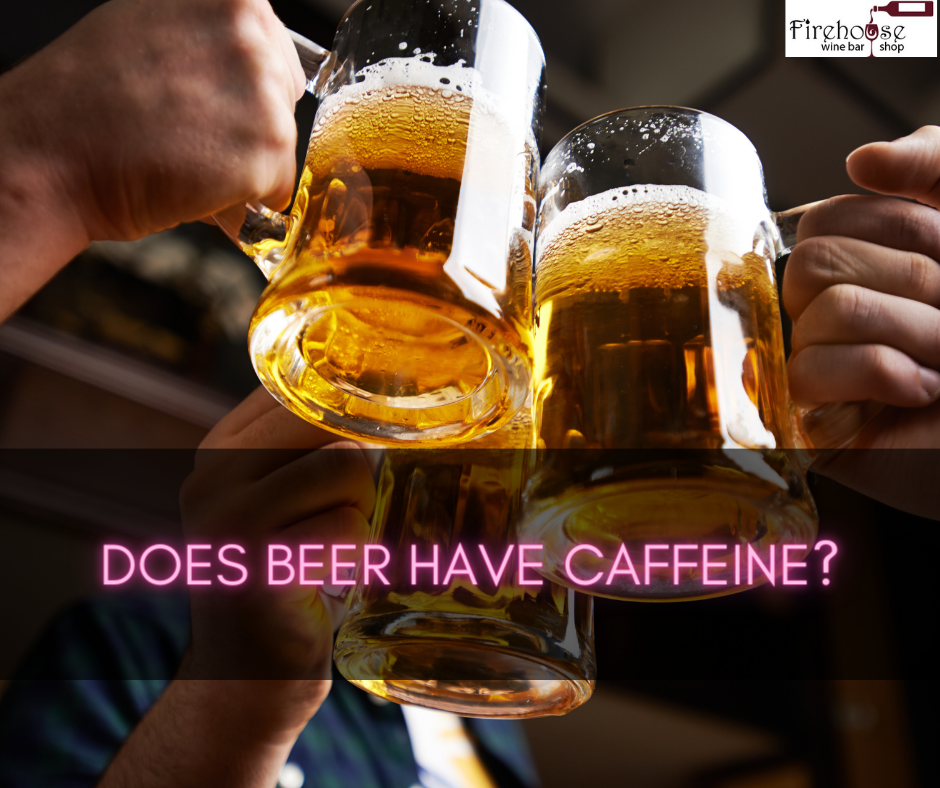Introduction
One of the most common misconceptions about beer is the belief that it contains caffeine. Many people quickly assume that beer, like coffee or energy drinks, can provide an energizing effect due to the presence of caffeine. However, this is a myth that needs to be debunked. But Does Beer Have Caffeine? In reality, traditional beer does not contain caffeine as an inherent ingredient.
Explanation Of The Myth Surrounding Caffeine In Beer
The myth of caffeine in beer likely stems from caffeine in coffee, tea, and cocoa beans, commonly associated with stimulating beverages. Additionally, specialty beers incorporate coffee, chocolate, or other caffeinated ingredients to create unique flavors and aromas. However, these beers, known as coffee stouts or chocolate porters, typically contain only small amounts of caffeine compared to a standard cup of coffee or tea.
The brewing process of traditional beer involves the fermentation of malted grains, such as barley, and the addition of hops for bitterness and aroma. These ingredients do not naturally contain caffeine, which is not produced during fermentation. Therefore, traditional beer does not inherently contain caffeine.
The Importance Of Debunking This Myth
It is important to debunk the myth of caffeine in beer because misinformation can lead to misunderstanding and potentially harmful consumption habits. Drinking beer expecting an energizing effect from caffeine can lead to disappointment and confusion. Additionally, it is crucial for individuals with caffeine sensitivities or those looking to avoid caffeine to have accurate information when making beverage choices.
Understanding the caffeine content in different beverages allows individuals to make informed decisions that align with their desired energy levels and overall health goals. By debunking this myth and clarifying that traditional beer does not contain caffeine, beer enthusiasts can enjoy their favorite brews without confusing their stimulant intake.
In conclusion, traditional beer does not contain caffeine as an inherent ingredient. While specialty beers are available that incorporate small amounts of caffeine through coffee, chocolate, or other ingredients, they are the exception rather than the norm. By dispelling the myth of caffeine in beer, we can promote accurate information and ensure that individuals can confidently enjoy their favorite beverages.

The Ingredients Of Beer
There is a common misconception that beer contains caffeine. However, the truth is that traditional beer does not naturally contain caffeine. To understand why, let’s take a closer look at the ingredients of beer and how it is brewed.
Breakdown Of The Main Ingredients Of Beer
Beer is typically made using four main ingredients: water, grain (such as barley), yeast, and hops. These ingredients are mixed and undergo a fermentation process, where yeast converts the sugars in the mixture into alcohol and carbon dioxide. This process gives beer its alcoholic content and carbonation.
Confirmation That None Of These Ingredients Naturally Contain Caffeine
None of the four main ingredients of beer – water, grain, yeast, and hops – naturally contain caffeine. Caffeine is a natural substance found in approximately 60 plants worldwide, with coffee beans and tea leaves being the most common sources. However, these sources are not used in the traditional beer brewing process.
While some specialty beers are flavored with coffee or chocolate, the caffeine content in these beers is usually negligible. The amount of caffeine in coffee-flavored beers can vary depending on how the coffee flavor is added during the brewing process. Some recipes may use cold-brewed coffee, while others use roasted coffee beans. However, the caffeine content in these beers is typically much lower than that found in a regular cup of coffee.
In summary, traditional beer does not naturally contain caffeine. While some beer styles may be flavored with coffee or contain other substances with caffeine, the amount of caffeine in these beers is usually minimal. It is important to note that consuming alcohol combined with caffeine in large quantities is not considered safe. If you have concerns about caffeine in beer or its effects, it is always best to consult a healthcare professional.
Brewing Process
When it comes to the question of ‘Does Beer Have Caffeine?’, there is a common misconception among many drinkers. The truth is that traditional beer does not naturally contain caffeine. To understand why, let’s look at the brewing process and the ingredients used.
Overview Of The Brewing Process
Beer is brewed using four main ingredients: grains, yeast, hops, and water. These ingredients are mixed and allowed to ferment. During fermentation, the yeast converts the sugars in the mixture into alcohol, resulting in beer. None of these components contain caffeine, including grains, yeast, hops, or water.
Explanation Of Why Caffeine Is Not Created During Fermentation
Caffeine is a natural substance found in various plants but not in any ingredients used to make beer. Caffeine is typically extracted from the cacao plant and is not produced during fermentation.
However, it is important to note that certain beer styles, such as coffee stouts, contain caffeine. In these cases, real coffee is added to the beer during brewing, often after fermentation. This addition of coffee gives the beer a flavor and a small amount of caffeine.
Here’s a table to summarize the key points:
| Brewing Process | Caffeine Content |
|---|---|
| Traditional Beer | No caffeine |
| Coffee Flavored Beer | Contains caffeine |
It is essential to differentiate between traditional beer and beer with coffee added for flavor. While traditional beer does not contain caffeine, beer with coffee flavoring can have a small amount.
In conclusion, the myth that beer naturally contains caffeine is debunked. Traditional beer does not have caffeine, as it is not present in the ingredients used during brewing. However, coffee-based beer can contain a small amount of caffeine. It is important to be aware of the caffeine content in specific beer styles and to consume alcoholic beverages responsibly.

Coffee-flavored Beers
Contrary to popular belief, traditional beer does not contain caffeine. Beer is brewed using four main ingredients: grains, yeast, hops, and water, none of which naturally contain caffeine. However, certain beer styles are infused with coffee, and these coffee-flavored beers may contain caffeine.
Explanation Of How Coffee-flavored Beers May Contain Caffeine
Coffee-flavored beers have coffee added to them during the brewing process, usually after fermentation. This infusion of coffee imparts a rich and robust coffee flavor to the beer. As a result, these coffee-flavored beers do contain trace amounts of caffeine.
Discussion Of The Different Methods Of Adding Coffee To Beer
There are different methods for adding coffee to beer, which can affect the caffeine content. Some recipes call for directly adding cold-brewed coffee to the beer before it is packaged. This method allows the flavors of the coffee to blend with the beer. Alternatively, roasted coffee beans can be crushed and added to the fermenter after active fermentation. This allows the taste of the coffee beans to infuse into the beer.
It is important to note that the caffeine content in coffee-flavored beers is quite low. Generally, breweries do not specify the amount of caffeine in their beers, as it is considered negligible. For comparison, the average 12 oz cup of coffee can contain anywhere from 120 mg to 255 mg of caffeine, while a 12 oz serving of the strongest coffee beer may contain up to 50 mg of caffeine but often contains much less.
In conclusion, while traditional beer does not contain caffeine, coffee-flavored beers may contain trace amounts of caffeine due to the addition of coffee during the brewing process. The caffeine content in these beers is generally quite low and unlikely to have a significant impact. It is always advisable to drink responsibly and be aware of your sensitivities to caffeine and alcohol.
Caffeine Content In Beer
Many beer enthusiasts have wondered whether beer contains caffeine, especially when it comes to coffee-infused or coffee-flavored beers. The answer is simple: traditional beer does not naturally contain significant amounts of caffeine. Beer is typically brewed using four main ingredients – water, hops, grains, and yeast – none containing caffeine.
Explanation Of The Trace Amounts Of Caffeine Found In Beer With Coffee Flavors
While beer itself does not contain caffeine, the presence of caffeine in beer can occur when coffee is added to the brewing process. Coffee-flavored beers are typically brewed by aging the beer on coffee beans or grounds, allowing the flavor of coffee to infuse into the beer. During this process, a small amount of caffeine from the coffee may transfer to the beer, resulting in trace amounts of caffeine in the final product.
However, it is important to note that the caffeine content in coffee-style beers is generally quite low. The amount of caffeine in a coffee-style beer can vary depending on factors such as the type of coffee used, the amount of coffee added, and the brewing process. In most cases, the caffeine content in a 12-ounce serving of coffee-style beer is significantly less than that of a standard cup of coffee.
Comparison Of Caffeine Content In Coffee And Coffee-style Beer
To put the caffeine content in coffee-style beers into perspective, let’s compare it to the caffeine content in a standard cup of coffee.
| Beverage | Caffeine Content (per 12-ounce serving) |
|---|---|
| Coffee | Varies, ranging from 120 mg to 255 mg |
| Coffee-Style Beer | Typically, less than 50 mg |
As you can see, even the strongest coffee-style beers contain much less caffeine than a standard cup of coffee. The caffeine content in coffee-style beers can vary depending on the beer and brewing process. However, it is generally safe to say that the caffeine content in coffee-style beers is unlikely to keep you awake at night.
In conclusion, while traditional beer does not naturally contain caffeine, coffee-style beers may contain trace amounts of caffeine due to the addition of coffee during the brewing process. However, the caffeine content in these beers is typically quite low compared to a standard cup of coffee. So, if you enjoy the flavor of coffee-infused beers, you can rest assured that the caffeine content is unlikely to impact your sleep significantly.

Does Beer Have Caffeine? – Debunking The Myth Of Caffeine In Beer
There seems to be a persistent myth about the presence of caffeine in beer. Many people wonder, ‘Does Beer Have Caffeine?’. However, the truth is that traditional beer does not naturally contain caffeine.
Beer is brewed using four main ingredients: grains, yeast, hops, and water. None of these components contain caffeine. During the fermentation process, the yeast converts the sugars in the mixture into alcohol and carbon dioxide, not caffeine. Caffeine is a naturally occurring chemical found in various plants but is not part of beer-making.
While beer does not have caffeine, certain beer styles may contain added caffeine for flavor. One example is coffee-flavored beers, where real coffee is added during brewing to infuse the beer with a coffee taste. In these cases, a small amount of caffeine may be present due to the addition of coffee. However, it’s important to note that caffeine in coffee-style beer is typically much lower than what you would find in a regular cup of coffee or energy drink.
To further clarify the caffeine content in beer, let’s compare it to other beverages:
| Beverage | Caffeine Content |
|---|---|
| Coffee | High |
| Energy Drinks | High |
| Coffee-Style Beer | Low |
| Traditional Beer | No Caffeine |
As you can see, traditional beer falls into beverages without caffeine. It is important to understand that caffeine is not a usual component of beer and should not be a concern for most beer enthusiasts.
It’s worth mentioning that there have been instances where certain alcoholic beverages, such as Four Loko and Joose, incorporated both caffeine and alcohol. However, the Food and Drug Administration (FDA) issued warnings regarding the dangers of combining caffeine and alcohol, leading to the removal of caffeine from these products.
In conclusion, while some beer styles may contain caffeine due to the addition of coffee, traditional beer does not naturally contain caffeine. It is important to debunk the myth and clearly understand the ingredients in beer. So, next time you reach for a cold one, you can enjoy it without worrying about consuming caffeine.
Potential Risks Of Combining Alcohol And Caffeine
Explanation Of The Effects Of Combining Alcohol And Caffeine
There is a common misconception that beer contains caffeine, leading to the belief that it can provide a stimulating effect similar to that of caffeinated beverages. However, it is important to debunk this myth and understand the potential risks of combining alcohol and caffeine.
Contrary to popular belief, beer does not contain caffeine unless it is specifically added as an ingredient. Beer is primarily made from water, malted barley, hops, and yeast without caffeine. Therefore, drinking beer alone will not produce the stimulant effects commonly associated with caffeine consumption.
Discussion Of The Risks And Dangers Of This Combination
While beer does not contain caffeine, combining alcohol and caffeine in other forms, such as energy drinks or mixed beverages, can have dangerous effects. Studies have shown that when alcohol and caffeine are mixed, the caffeine can mask the depressant effects of alcohol, leading individuals to feel more alert and less impaired than they are.
This can increase the risk of excessive drinking, as individuals may consume more alcohol than they normally would without experiencing the usual sedative effects. It can also lead to risky behaviors, such as impaired judgment, engaging in dangerous activities, and an increased likelihood of accidents or injuries.
Additionally, combining alcohol and caffeine can adversely affect the cardiovascular system, potentially increasing heart rate and blood pressure. This combination can also disrupt sleep patterns and lead to dehydration.
It is important to recognize the potential risks and dangers of combining alcohol and caffeine. Responsible drinking and making informed choices about consumption are essential to minimize potential health risks and ensure the well-being of individuals.
Always consume alcohol and caffeine-containing beverages in moderation and be aware of the potential risks associated with their combination. Understanding the effects and risks can help individuals make responsible decisions and avoid potential harm.
Please note that this information specifically applies to beer and its caffeine content. Other beverages, such as mixed or energy drinks, may contain caffeine and have different effects when combined with alcohol.
FAQ: Does Beer Have Caffeine? – Debunking the Myth of Caffeine in Beer
Q: Does beer contain caffeine?
A: No, beer does not naturally contain caffeine. Beer is an alcoholic beverage typically made from fermented grains, hops, water, and yeast. It does not contain caffeine as part of its standard brewing process.
Q: Can I find caffeine in any beer?
A: Some specialty or craft beers may include added caffeine or be brewed with ingredients that naturally contain caffeine, such as coffee or chocolate. However, these types of beers are not the norm and are not commonly found in most beer varieties.
Q: Is caffeine content mentioned on beer labels?
A: In most cases, the caffeine content is not required to be listed on beer labels, especially for standard beer varieties. However, beers that contain added caffeine or other stimulants are often required to have it clearly stated on the label.
Q: Can drinking beer with caffeine in it have any health risks?
A: Beers with added caffeine may carry potential risks associated with increased caffeine intake, such as increased heart rate or blood pressure. Some studies have suggested that combining alcohol and caffeine can lead to risky behaviors, so it’s important to be aware of the potential effects and drink responsibly.
Q: Are there any benefits to consuming beer with caffeine?
A: While the combination of alcohol and caffeine can create various flavors and taste experiences, no specific health benefits are associated with consuming beer with added caffeine. The effects of caffeine in beer are generally limited to its taste rather than any potential health benefits.
Q: Can caffeine withdrawal occur from drinking beer with caffeine?
A: If beer contains added caffeine, then it is possible to experience withdrawal symptoms similar to those associated with caffeine withdrawal. However, it’s worth noting that most standard beers do not contain caffeine, so this is not a common concern for beer drinkers.
Q: How can I identify if a beer contains caffeine?
A: If you’re unsure whether a particular beer contains added caffeine, you can check the label or product description for any mention of caffeine as an ingredient. Specialty beers brewed with coffee or other sources of caffeine will often highlight this information on the packaging or in their product descriptions.
Conclusion
Now you know the answer to ‘Does Beer Have Caffeine?’. After delving into the world of beer production and exploring the sources of caffeine, it is clear that the myth of caffeine in beer has been debunked. Traditional beer does not have caffeine as an inherent ingredient. While certain beers may contain small amounts of caffeine, the levels are significantly lower than other caffeinated beverages such as coffee or energy drinks. Lighter beers generally have lower caffeine content than darker beers, and the brewing process and specific beer types can also influence caffeine levels.
Summary Of The Debunked Myth Of Caffeine In Beer:
- Traditional beer does not have caffeine as an inherent ingredient.
- If present, the caffeine content in beer is significantly lower than in other beverages.
- Lighter beers generally have lower caffeine content compared to darker beers.
- The brewing process and specific beer types can influence caffeine levels.
Final Thoughts On Enjoying Beer Responsibly And Knowledgeably:
While caffeine may not be a significant concern regarding beer consumption, it is important to enjoy beer responsibly and in moderation. Understanding the caffeine content in different beer types and opting for light beers or non-alcoholic alternatives can be advisable for those avoiding caffeine. It is also essential to be aware of the potential effects of alcohol consumption and to drink responsibly.
As with any alcoholic beverage, it is crucial to prioritize responsible consumption and make informed choices. Enjoying beer knowledgeably allows you to appreciate the diverse flavors and experiences it has to offer. Whether you prefer traditional beer, caffeine-infused beers, or other unique brews, knowing their caffeine content and understanding your limits will ensure a safe and pleasurable drinking experience.
In conclusion, the myth of caffeine in beer has been debunked, and it is important to have accurate information to make informed choices when it comes to enjoying beer responsibly. So, sit back, relax, and savor your favorite brew confidently, knowing you have the right knowledge about the caffeine content in beer.

Andre Lotz immigrated to the United States from South Africa almost 20 years ago. Still, he didn’t feel truly at home until he settled in Mobile—a city that reminds him of his childhood home of Fish Hoek on the southern cape of Africa.

